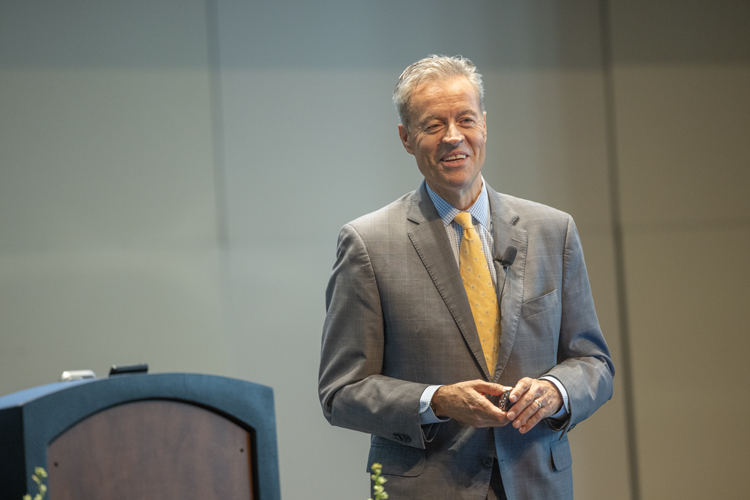Chancellor Mark Mone’s annual plenary address urged all UWM employees to expand UWM’s student-centric focus and help combat drops in enrollment and student retention.
Mone spent much of his Thursday address at the Helene Zelazo Center explaining the need for dramatic operational changes at every level. At the crux of his message was this: “Students’ success equals UWM success.”
Mone celebrated many UWM successes, including its reaccreditation and the Zilber Family Foundation’s recent $20 million donation to the Zilber College of Public Health. But he didn’t shy away from noting the challenges that UWM is facing.
“There are a lot of great things happening,” Mone said. “But it’s no longer time for incremental changes. It’s time for dramatic changes so we can adapt and achieve future momentum. We’ve got to think internally about how to attract and retain students, because they are telling us they have other options besides going to college.”
Although overall enrollment at UWM is down 1.2% from last year, Mone said other metrics may be more concerning. For example, 27.5% of last year’s freshmen didn’t return this year, and those declining re-enrollments amount to $16 million in lost revenue. And graduation rates lag, with just over 30% of new freshmen graduating in four years and less than 50% finishing their degree in six years.
“It would be financially profound if we could elevate a portion of that $16 million,” he said. “We would be a different university. That’s the difference that enrollments make.”
It’s another reason Mone believes a re-emphasis on student success is so crucial to UWM’s future, particularly as college costs rise. He noted that many experts say universities haven’t adapted to meet students where they are or adequately address barriers. “Students are now turning it 180 degrees and they say it’s on us,” Mone explained. “We own student success, or failure. If that person doesn’t come back, it’s because of something we’re doing.”
A new culture needed
As an example of change UWM must consider, Mone reported that some smaller schools are trying unprecedented ideas to grow a caring culture. Amarillo College, for example, hired 16 social workers to help address student needs, including housing, food insecurity and mental health issues.
Mone said a care component must be part of everything UWM does in classrooms, in campus services and beyond. UWM has already started identifying and addressing those needs in its 2030 Plan and through its Campus Cares program.
Mone also prioritized working with academic partners so that every credit a student earns at a technical college will transfer to UWM. That would offer “game-changing” benefits for students, who could graduate sooner and spend less money when transferring. He noted that other institutions, like Carthage College, have such arrangements in place.
Mone put forth some additional ideas to benefit student success:
- Improving early warnings and additional support that struggling students need to preserve their academic standing during the semester.
- Involving students in course design and evaluation. (“Have I gone too far?” Mone asked.)
- Expanding the Campus Cares program to enhance students’ sense of belonging. Mone envisions more events, such as the Sept. 13 Wellness Symposium and Resource Fair, which featured TEDx-like talks on wellness.
- Extending the Tuition Promise program to help underserved Wisconsin students pay for college. “It’s made a big difference for us,” Mone said. “We’re really working hard to be able to fund this ourselves and continue it here.”
- Encouraging employees to be gateways that better connect students to multicultural resource centers, the Writing Center, the Accessibility Resource Center, the Student Success Center and other resources.
- Streamlining UWM’s curriculum, including a fresh look at GED requirements.
- Achieving parity in graduation rates across all student demographics.
Plenty of good news
Despite the headwinds, UWM continues to be highly ranked on several surveys, ranging from the Princeton Review’s best Midwestern rankings to its Military Friendly School gold status to its top-10 nationwide rating as an LGBTQ-friendly school. And UWM has earned accreditation from the Higher Learning Commission, a process completed every 10 years that makes almost $200 million in federal money available for UWM and its students.
Student support continues through various programs, such as Moon Shot for Equity, which has already helped close UWM graduation rate gaps between white students and students of color by 4%. Also, programs like M-Cubed have helped generate a 25% increase in high school students completing the Free Application for Federal Student Aid.
UWM also enjoyed a banner philanthropic year, with University Advancement celebrating the second-highest amount of annual funds ever raised at UWM. Those efforts will support a new research vessel for the School of Freshwater Sciences, five more years of support for the Northwestern Mutual Data Science Institute, additional donations to Moon Shot for Equity, and the record-breaking $20 million donation that creates “forever funds” for the Zilber College of Public Health.
The physical campus is growing, with the new Chemistry/STEM building slated to open in summer 2024, the opening of the Orthopedic Hospital of Wisconsin-backed addition to the Klotsche Center, and the renovation of the UWM Student Union nearly completed.
And a request for a 4% increase in UW System employee wages for 2023 and another 2% for 2024 was referred to the Wisconsin Legislature’s Joint Committee on Employment Relations over the summer. Deliberations could take several more weeks and could include changes to the motion.






